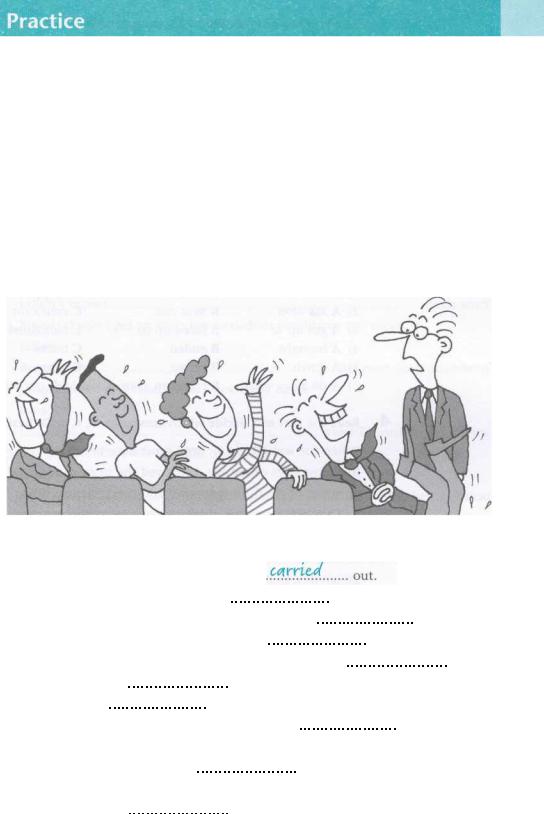
3_Macmillan_-_Advanced_Language_Practise
.pdf
A D V A N C E D LANGUAGE PRACTICE
4 Complete the second sentence so that it has a similar meaning to the first sentence, using the word given. Do not change the word given.
•
a) Speaking for my colleagues, I would like to thank you.
of
On
b) I thought you had accepted his offer.
I would like to thank you.
under |
|
I was |
that you had accepted his offer. |
c) Everyone was exhausted apart from Sally. |
|
of |
|
With |
, everyone was exhausted. |
d)I like to spend most of my time in the open air. doors
|
I like to |
most of the time. |
e) |
I don't think you mean what you say about disliking me. |
|
|
serious |
|
|
I don't think you're |
disliking me. |
f) |
Nothing unusual ever happens here. |
|
|
ordinary |
|
|
Nothing out |
ever happens here. |
g) |
I wish I knew what to do about this problem. |
|
|
solution |
|
|
I wish I knew what |
this problem. |
h) |
You can walk to the station easily from the hotel. |
|
|
within |
|
|
The station is |
of the hotel. |
i) Karen received a medal for her services to the country. |
||
|
recognition |
|
|
Karen received a medal |
her services to |
|
the country, |
|
j) |
You have to pay your son's debts, as he is under age. |
|
|
liable |
|
|
You |
your son's debts, as he is under age. |
142

G R A M M AR 22 PREPOSITION S
5 Complete the text with a suitable preposition in each space.
David Peters, the Scottish long-jumper, has been awarded a knighthood in
recognition (1) ...of his services to charity and the world of athletics.
Sir David, as he will be known, will be knighted by the Queen in a ceremony next week. Mr Peters, who retired from athletics last year, had a talent which
was, quite simply, (2) |
of the ordinary. All his performances were, |
|
(3) |
exception, characterised by great effort and determination. He |
|
seemed to thrive on difficult situations, and it was when (4)
pressure, that he produced his greatest performances. In later years, he became
increasingly prone (5) |
injury, and last year, his talents evidently |
|
(6) |
decline, he failed to regain his Olympic long-jump title, and |
|
promptly retired. At his best, however, his jumping was sometimes |
||
(7) |
belief, and in his greatest year, 2000, he broke the world |
|
record no fewer than four times. In the late 1990s he was single-handedly |
||
responsible (8) |
|
bringing British athletics out of a severe slump |
with his inspirational performances and personal charisma. Peters was capable
(9) great generosity, and once, famously, failed a jump
deliberately in order to let his great rival, Aravan Sijipal, win on his farewell appearance. When being interviewed, Peters was also an exception to the rule, for he always tried to praise others rather than blow his own trumpet. A deeply
religious man, he was (10) dispute with the athletics authorities
on more than one occasion for his refusal to compete on Sundays. His anti-
drugs campaign had a great effect (11) |
young athletes all over |
||
Britain, and throughout his career, he remained very conscious |
|
||
(12) |
what he saw as his public duty in this respect. Many |
||
charitable organisations have reason to be grateful (13) |
him |
||
(14) |
the time he devoted to raising money for their causes. |
||
OUnderline the correct word in each sentence.
a)Diane showed a complete disregard for/with her own safety.
b)I was totally baffled by/of Tim's behaviour.
c)For Romeo and Juliet it was love at/with first sight.
d)They wouldn't let me in the pub because I was below/under age.
e)Our house has been in/on the market for months.
f) You are perfectly capable for/of making your own bed, I would have thought!
g)We walked on tiptoe for/from fear of being discovered
h)This is one of the exceptions of/to the rule.
i)I am surprised at/by you, forgetting your briefcase like that.
j)We met at the hotel completely by/from coincidence.
143

Explanations
This unit (and Grammar 24 and 25) assume that a wide range of phrasal verbs, and their grammatical types, are already known. These units focus on multiple meaning, and other meanings of known phrasal verbs. Note that there may be other meanings for the verbs listed here.
Add up (make sense)
His evidence just doesn't add up.
Ask after (inquire about)
Jim was asking after you.
Back down (yield in an argument)
Sheila was right, so Paul had to back down.
Bargain for (take into account)
We hadn't bargained for there being so much traffic, and we missed the plane.
Bear out (confirm the truth)
Helen's alibi was borne out by her sister.
Break down (lose control of the emotions)
David broke down and wept when he heard the news.
Break off (stop talking)
He broke off to answer the phone.
Break up (come to an end)
The party finally broke up at 3.00 am.
Bring about (cause to happen)
The crisis was brought about by Brenda's resignation.
Bring off (succeed in doing something)
The team tried for years to win the competition and they finally brought it off.
Bring on (cause the onset of an illness)
Sitting in the damp brought on his rheumatism.
(cause trouble to happen to oneself)
You have brought this on/upon yourself.
Bring round (influence someone to your point of view)
After much discussion, I brought the committee round to my point of view.
Bring up (mention)
/ feel I ought to bring up another small matter.
Call up (mobilise for military service)
Mark was called up when the war broke out.
Carry off (complete successfully - perhaps despite a problem)
Jane had a difficult role to play, but she carried it off.
Carry out (complete a plan)
The attack was successfully carried out.
144
G R A M M A R 23 PHRASA L VERB S 1
Catch on (become popular - colloquial)
This new hair style is beginning to catch on.
Come about (happen)
Let me explain how the situation came about.
Come down to (be in the end a matter of)
It all conies down to whether you are prepared to accept less money.
Come in for (receive - especially criticism, blame)
The government has come in for a lot of criticism over the decision.
Come off (take place successfully)
I'm afraid that deal didn't come off after all.
Come out (appear)
All the flowers have come out.
When the news came out, everyone was shocked.
My photos didn't come out very well.
Come up (occur - usually a problem - colloquial)
Look, something has come up, and I can't meet you.
Come up against (meet a difficulty)
We've come up against a bit of a problem.
Come up to (equal - especially expectations, standard) The play didn't come up to expectations.
Come up with (think of - especially an answer, a plan, a solution) We still haven't come up with a solution to the problem.
Count on (rely on)
Don't worry, you can count on me.
Crop up (happen unexpectedly - colloquial)
/ can't come to your party, something has cropped up.
Do away with (abolish - colloquial)
Dog licences have been done away with.
(murder - colloquial)
What if they do away with the old man?
Do up (decorate - colloquial)
We are having our living room done up.
Draw up (come to a stop)
A white sports car drew up outside the door.
Draw up (organise - especially a document)
The contract is being drawn up at the moment.
Drop in (pay a visit - colloquial)
Drop in any time you're passing.
Drop off (fall asleep - colloquial)
The baby has just dropped off.
End up (finish in a certain way, or place)
We ended up staying there for lunch.
The car ended up in a ditch.
145
A D V A N C E D LANGUAG E PRACTIC E
Face up to (have courage to deal with - especially responsibilities)
You have to face up to your responsibilities.
Fall about (show amusement - especially laughing - colloquial)
Everyone fell about when Jane told her joke.
Fall back on (use as a last resort)
If the worst comes to the worst, we've got our savings to fall back on.
Fall for (be deceived by - colloquial)
It was an unlikely story but he fell for it.
(fall in love with - colloquial)
/ fell for you the moment I saw you.
Fall out with (quarrel with)
Peter has fallen out with his boss.
Fall through (fail to come to completion)
The plan fell through at the last minute.
Feel up to (feel capable of doing)
Old Mr Smith didn't feel up to walking all that way.
Follow up (act upon a suggestion)
Thanks for the information about that book. I'll follow it up.
(take more action)
We'll follow up this lesson next week.
Get across (be understood - especially get an idea across) I had the feeling I wasn't getting the meaning across.
Get at (imply - about personal matters - colloquial)
What are you getting at exactly?
Get down to (begin to seriously deal with)
It's time we got down to some real work.
Get off with (avoid punishment)
They were lucky to get off with such light sentences.
Get on for (approach a certain age/time/number)
He must be getting on for seventy.
Get on (make progress - especially in life)
Sue is getting on very well in her new job.
Get over (be surprised)
7 couldn't get over how well she looked.
Get over with (come to the end of something, usually unpleasant) /'// be glad to get this awful business over with.
Get round to (find time to do - also around)
Sorry, but I haven't got round to fixing the tap yet.
Get up to (do something - usually bad when about children - colloquial)
The children are getting up to something in the garden. What have you been getting up to lately?
146

G R A M M A R 23 P H R A S A L VERB S 1
Underline the correct word or phrase in each sentence.
a)Jim completely fell for my joke/story.
b)The conversation/meeting didn't break up until late.
c)It seems that we've come up against rather a tricky idea/problem.
d)It must be getting on for six o'clock/extremely well.
e)The witness's evidence bore out what Peter had said/as Peter said.
f)I really should get down to my homework/the weather.
g)Unfortunately my plan/suggestion didn't quite come off.
h)Mary's new novel doesn't come up to her usual expectation/standard.
i)Last night I dropped off at 11.30/from 11.30 until 7.00 this morning,
j)When David started speaking everyone fell about in laughter/laughing.
Put one suitable word in each space.
a) |
When I give an order I expect it to be |
|
|
|
b) |
Getting up so early really gets me |
, |
|
|
c) |
It was a good idea, but I'm afraid it didn't quite |
|
off. |
|
d) |
I'm afraid that your story doesn't really |
|
up. |
|
e) |
I was so surprised when Harry got the job, I couldn't |
over it. |
||
f) |
Terry's new book |
out next week. |
|
|
g) Someone was |
after you in the club yesterday. |
|||
h) I tried to get an early night, but just as I was |
|
off, the phone |
||
|
rang, |
|
|
|
i) |
Neil was too embarrassed to |
up the question of who would |
||
|
pay. |
|
|
|
j) |
The police didn't |
up Bill's complaint about his neighbours. |
||
147

A D V A N C E D LANGUAG E PRACTIC E
3 Read the text and decide which answer (A, B, C or D) best fits each space.
The Terrys were sitting calmly having afternoon tea in their lounge when the
van (1) ...A..... up outside. The words 'Reliable Removals - you can (2) us'
were printed on the side of the van in large blue capitals. Soon afterwards, an enormous man covered in tattoos appeared on the doorstep. Tim opened the
door. 'Sorry we're late, guv,' said the tattoo man, 'we hadn't (3) all the
traffic on the motorway, otherwise we'd have been here sooner. Isn't that right, Lester? His companion, an unshaven man roughly half his size, joined in: 'We
didn't budge for a good half hour, and we (4) up coming off the
motorway and going through the villages. I did try and phone, but I couldn't
get (5) Anyway, we're here now, so let's (6) some serious work.'
Tim said, 'Erm, I think there's been some sort of misunderstanding, gentlemen.'
1) A drew |
Bfollowed |
C cropped |
D called |
|
2) |
A ask after |
B bear out |
C count on |
D draw up |
3) |
A got up to |
B faced up to |
C bargained for |
D added up |
4) |
A brought |
B ended |
C broke |
D came |
5) |
A down |
B across |
C over |
D through |
6) |
A do away with |
B come up against |
C fall out with |
D get down to |
Read the text and decide which answer (A, B, C or D) best fits each space.
When the war (1) ..C. out I must have been (2) 18 years of age, and
like most boys of my age, I received the news with a kind of naive enthusiasm,
born out of youthful ignorance and inexperience. When I was (3) , I still
had a romantic vision of marching quickly to victory and being home in time for tea. I have an old picture of myself standing proudly in my new uniform - a
young man about to (4) |
his responsibilities in life. I look like a boy |
||||
pretending to be a man - and not quite managing to (5) |
it off. Little did I |
||||
realise just what I had (6) |
|
|
|
||
1) |
A came |
B bore |
|
C broke |
D carried |
2) |
A getting on for |
B falling back on |
C getting round to |
D feeling up to |
|
3) |
A counted on |
B broken up |
C called up |
D asked after |
|
4) |
A draw up |
B face up to |
C do away with |
D bring about |
|
5) |
A call |
Bbreak |
|
C get |
D carry |
6) |
A come in for |
B come up against |
C come down to |
D come up with |
|
148

G R A M M AR 23 P H R A S A L V E R B S 1
5Complete the second sentence so that it has a similar meaning to the first sentence, using the word given. Do not change the word given.
a) They didn't punish Karen, only gave her a warning.
got
Karen |
..got |
off |
with |
a warning. |
b) What sort of progress are you making in your new job? |
|
|||
getting |
|
|
|
|
How are |
|
|
|
in your new job? |
c)There were no taxis so in the end I had to walk home. up
Because there were no taxis I |
home. |
d) I'm doing more work than I bargained for. |
|
be |
|
I didn't expect |
much work. |
e)Brenda doesn't get on with her next-door neighbour any more. fallen
Brenda has |
her next-door neighbour. |
f)I broke down and cried when I heard the news. into
I |
when I heard the bad news. |
g) The best solution was thought of by Sally. |
|
came |
|
Sally |
the best solution. |
h) Soon it will be time for lunch. |
|
getting |
|
It's |
lunch time. |
i)What happened confirmed the truth of Jack's prediction. borne
Jack's prediction |
by subsequent events. |
j) Carol has trouble communicating her ideas to others. |
|
her |
|
Carol has trouble .. |
.. across. |
149

Explanations
This unit (and Grammar 23 and 25) assume that a wide range of phrasal verbs, and their grammatical types, are already known. These units focus on multiple meaning, and alternative ways of expressing meanings of phrasal verbs. Note that there may be other meanings for the verbs listed here.
Give away (betray)
His false identity papers gave him away.
Give off (send off a smell - liquid or gas)
The cheese had begun to give off a strange smell.
Give out (be exhausted)
When our money gave out we had to borrow some.
Give over (abandon, devote)
The rest of the time was given over to playing cards.
(stop - colloquial)
Why don't you give over! You're getting on my nerves.
Give up (surrender)
The escaped prisoner gave herself up.
(believed to be dead or lost)
After ten days the ship was given up for lost.
Go back on (break a promise)
The management has gone back on its promise.
Go in for (make a habit of)
/ don't go in for that kind of thing.
(enter competition)
Are you thinking ofgoing in for the race?
Go off (become bad - food)
This milk has gone off.
Go on (happen - usually negative)
Something funny is going on.
Go round (be enough)
There weren't enough life-jackets to go round.
Go through with (complete a promise or plan - usually unwillingly)
When it came to actually stealing the money, Nora couldn't go through with it.
Grow on (become more liked - colloquial)
This new record is growing on me.
Hang onto (keep - colloquial)
/ think we should hang onto the car until next year.
Have it in for (be deliberately unkind to someone - also as have got) My teacher has (got) it in for me.
150
G R A M M A R 24 P H R A S A L V E R B S 2
Have it out with (express feelings so as to settle a problem)
/put up with the problem for a while but in the end I had it out with her.
Have someone on (deceive - colloquial)
/don't believe you. You're having me on.
Hit it off (get on well with - colloquial)
Mark and Sarah really hit it off at the party.
Hit upon/on (discover by chance - often an idea) They hit upon the solution quite by chance.
Hold out (offer - especially with hope)
We don't hold out much hope that the price will fall.
Hold up (delay)
Sorry I'm late, I was held up in the traffic.
(use as an example - i.e. a model ofgood behaviour) Jack was always held up as an example to me.
Hold with (agree with - an idea)
I don't hold with the idea of using force.
Keep up (continue)
Well done! Keep up the good work!
Lay down (state a rule - especially lay down the law)
The company has laid down strict procedures for this kind of situation.
Let down (disappoint, break a promise)
Sony to let you down, but I can't give you a lift today.
Let in on (allow to be part of a secret)
We haven't let Tina in on the plans yet.
Let off (excuse from punishment)
As Dave was young, the judge let him off with a fine.
Let on (inform about a secret - colloquial)
We're planning a surprise for Helen, but don't let on.
Live down (suffer a loss of reputation)
If City lose, they'll never live it down.
Live up to (reach an expected standard)
The play quite lived up to my expectations.
Look into (investigate)
The police have promised to look into the problem.
Look on (consider)
We look on this town as our real home.
Look someone up (visit when in the area)
If you're passing through Athens, look me up.
Make for (result in)
The power steering makes for easier parking.
Make off with (run away with)
The thief made off with a valuable necklace.
Make out (pretend)
Tim made out that he hadn't seen the No Smoking sign.
(manage to see or understand)
/ couldn't quite make out what the notice said.
151
